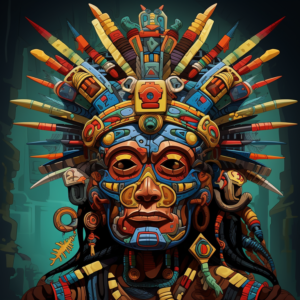Seker was the Memphite god of the dead. His name is alternatively spelled as “Sokaris” and “Sokar” in ancient Egyptian literature and “Socharis” in Greek literature.
Sokar’s name is derived from several origins. The first is “skr,” which translates to “cleaning the mouth.” This practice was common in the post-death ritual of separating the soul from the body in ancient Egyptian texts in preparation for passage from Earth to the underworld.
Origins
This association began in the Old Kingdom. In the New Kingdom, he is linked and sometimes physically connected with the Egyptian god Ptah – who is the god of creation, builders, and craftsmen, and also the husband of Bast – and the god Osiris. Collectively, the trio was referred to as “Ptah-Sokaris-Osiris.”
Symbols
As with many gods, Seker is depicted as part animal. His animal component is a bird, which is the creature affiliated with death. Along with his physical avian characteristics, Seker also has a hawk-like cry. In pictures he is illustrated in multiple ways. One is as a human with the head of a hawk. Sometimes he appears looking out from a mound, which is likely a burial mound. This indicates that a person has been successfully initiated to the underworld.
In other illustrations he is shown as a mummified hawk. Sometimes, he is shown riding on the back of a winged serpent, which is a symbol of freedom. It also symbolizes the successful transit of a departed soul to the underworld. One of the god’s nicknames is “God of Resteau,” which translates to the place of tomb entrances or other openings. Another is “he on the sand.” This name indicates that he presided over an area of the underworld filled with sandy terrain that was difficult to pass through.
Powers & Duties
Due to his association with Ptah, Seker presides over craftsmen whose role it was to build coffins and other material items necessary for a burial. The craftsmen also built silver bowls, which the god used as shoes to carry passengers to their burial tombs. In recognition of his importance as a craftsman leader, his image is often engraved on the walls of royal tombs.
In addition to serving as a god, Sokar worked as a silversmith, where he produced bowls and beautiful silver coffins.
Worship
Each April in Egypt, a festival was held in Seker’s honor. This festival was called the Henu Festival. The Henu festival celebrated the resurrection of the god Osiris, or Ausar, into Seker.
Henu festival participants, which number in the thousands, dressed in onion garlands. Festival processions often showed images of the god riding on a symbolic boat.
Facts About Seker
- He was one of the most important and idolized of all funerary gods.
- Seker had cult followings in Thebes and Memphis, where there were also worship centers in his honor.
- In contrast to his role in Egyptian mythology, he is sometimes seen as the god of resurrection and rebirth.
- The change in role is most commonly associated with his connection to Ptah and Osiris.
- Through connection with Osiris and Ptah represented death, stability, and creation, which are the three fundamental components of the universe.
- Onions, which symbolize fertility and rebirth, are considered a sacred plant.
- Sometimes navigated the difficult waters of the underworld on a sledge.
- Other times, Sokar crossed the underworld’s rivers in a boat without oars, signifying a symbolic ride.
- He also dug canals and ditches, but this depiction is less common.
- Often carried or wore a sceptre, which is essentially a three-pronged jester’s hat.
- The winged serpent on which Sokar rides protects him and the passenger to the underworld from large snakes.
- Protection from snakes also comes from the god Re whose archenemy is Apep, the winged serpent.
- Sometimes shown with a bandaged wing.
- In Egyptian mythology, his symbol is a boat perpetually sailing towards dawn.





